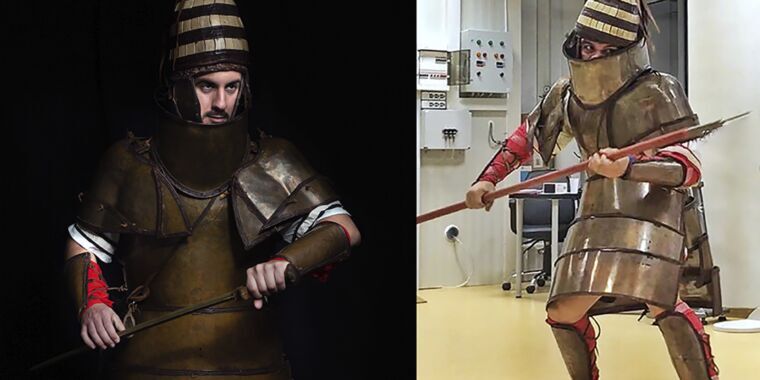- cross-posted to:
- [email protected]
- cross-posted to:
- [email protected]
I mean, it’s silly, but it looks pretty effective
It doesn’t even look that silly.
I immediately pictured Nandor the Relentless…
But like, we know from writings they had plate armor, we know from paintings this is what it looked like, it’s just archeologists insisted it wasn’t used because most soldiers weren’t buried with functional sets.
It’s like 5,000 years from now people saying we didn’t have tanks because no soldiers were buried with a tank.
A fighter in this armor at this time, was essentially that. A fucking tank.
And most military members don’t own their own personal tank.
This example, is because for whatever reason, one did back then. Probably more likely to be some incredibly rich ruler who would attend battle sites while in the best possible armor, but wasn’t ever going to swing a sword while wearing it.
If a normal soldier died wearing this, the government would repair the armor and issue it to a new soldier.
That one guy buried with a tank was the Mycenean Prighozhin. Richer than sense.
Burry me with my ERA
we know from paintings this is what it looked like
Do we, though? The article says “warriors were prominently featured in the Mycenaean art with numerous depictions showing their helmets, swords, spears, bows, and arrows in great detail. Armors, however, were mysteriously absent.”
The stripey hat confused the attackers who thought it was a giant bee, and got scared.
This is the best summary I could come up with:
It took over a decade of research, elaborate numerical models, and 13 Greek marines fighting in it from dawn till dusk to prove it was surprisingly good at its job, despite its odd appearance.
“This made the Mycenaean warriors some of the best equipped in the Eastern Mediterranean in the Late Bronze Age,” says professor Andreas Flouris, a researcher at the University of Thessaly, who led the study.
This wasn’t just the product of hunches or bias; warriors were prominently featured in the Mycenaean art with numerous depictions showing their helmets, swords, spears, bows, and arrows in great detail.
“The doubts about the Dendra armor’s purpose—whether it was battle-worthy or purely ceremonial—rose from a combination of its physical characteristics, the context in which it was found, and interpretations of historical texts,” says Wardle.
Among all the embellishments added to boost The Illiad’s epicness, it describes things like the daily activities and maneuvers of the Greek army, and those seem to be in line with realities of late Bronze Age warfare, according to Flouris’ team.
Still, using Homer’s works as a source of knowledge about military operations was a bit like reconstructing modern warfare’s practicalities based on Rambo movies.
The original article contains 700 words, the summary contains 198 words. Saved 72%. I’m a bot and I’m open source!
Bizarmour!
It pretty much looks like extended riot armor, of course it would work well




